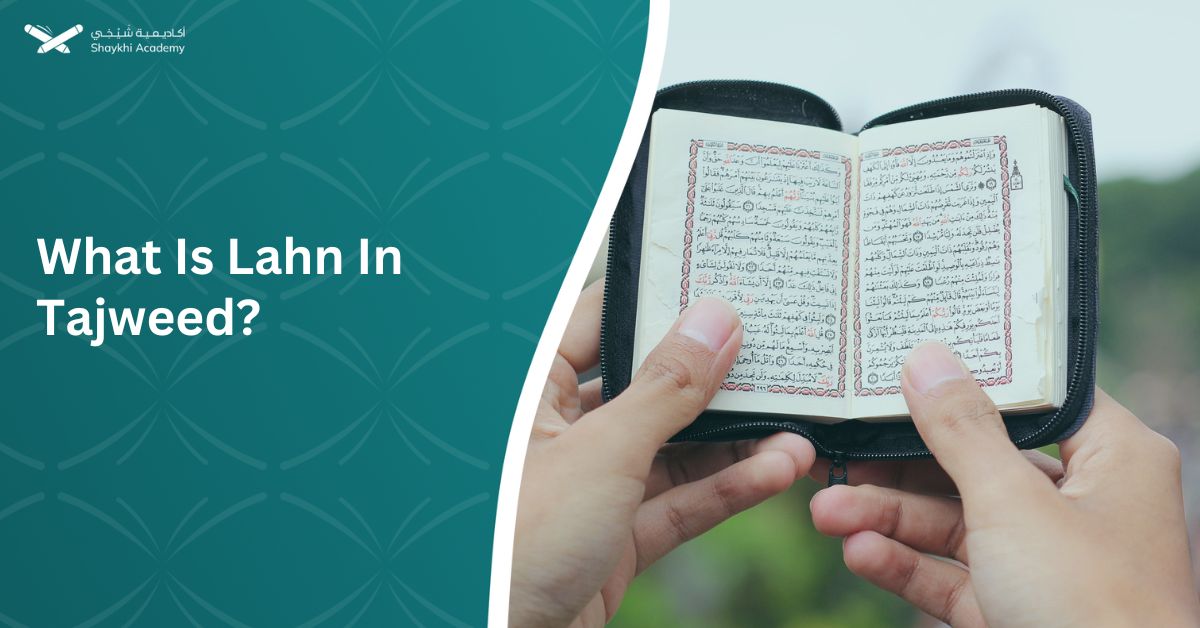Reciting the Qur’an with tajweed (proper pronunciation) is an individual obligation (fard ‘ayn) for anyone who wishes to read any part of the Qur’an. Consequently, making errors in recitation is prohibited, and distorting the words of the Qur’an is considered sinful.
Therefore, it is imperative for anyone reciting the Qur’an to be aware of common mistakes to avoid them. They should familiarize themselves with the types and forms of errors to recite the Qur’an accurately and to understand the verses correctly. This is why scholars have paid great attention to the sciences of the Qur’an and tajweed, as these sciences help protect the tongue from mistakes and errors.
Meaning of Lahn in Arabic (لحن):
In the Arabic language, “lahn” refers to an error or deviation from correctness. It denotes mistakes in pronouncing a word or in the correct application of diacritical marks (tashkeel) in the context of an Arabic sentence.
Such errors can occur by adding a letter to a word, omitting a letter from a word, substituting one letter for another, or pronouncing a word in a manner that contradicts the rules of grammar.
Meaning of Lahn (لحن) in Tajweed:
Lahn (error) in Tajweed and recitation is a deviation from correctness. The term Lahn is used to describe someone who recites in opposition to the proper rules of grammar and pronunciation, such as omitting a letter that is essential for the meaning or mispronouncing a word within the context of an Arabic sentence. Examples include changing the vowel marks in a way that alters the grammatical structure, like making the subject of a sentence the object or vice versa.
Here are some specific examples of Lahn in Qur’anic recitation:
– Substituting one letter for another, such as replacing the letter “ح” in “الْحَمْدُ لِلَّهِ” with “ه”.
– Adding a letter to a word, like inserting an “ا” after “لام” in “وَلَتُسْأَلُنَّ” making it “ولا تسألن”.
– Omitting a letter from a word or from the text, such as reading “إذا جاءت الطامة” instead of “فَإِذَا جَاءَتِ الطَّامَّةُ”.
– Substituting one word for another, like reading “والله غفور رحيم” instead of “وَاللَّهُ غَفُورٌ حَلِيمٌ” or vice versa.
– Adding a word to a verse, such as adding “مؤمنة” to “أَوْ تَحْرِيرُ رَقَبَةٍ”.
– Omitting a word from a verse, like reading “ولله ما في السموات والأرض” instead of “وَلِلَّهِ مَا فِي السَّمَاوَاتِ وَمَا فِي الْأَرْضِ”.
Errors can also occur with vowel marks and sukoon (non-vowel):
– Changing the fatḥah (a vowel mark denoting a short “a” sound) in “أَنْعَمْتَ” to a ḍammah (denoting a short “u” sound) or a kasrah (denoting a short “i” sound).
– Substituting a Sukoon with a fatḥah.
– Changing the ḍammah in “الْحَمْدُ” to a fatḥah or kasrah.
Types of Lahn in Tajweed:
Lahn (errors in recitation) is divided into two types:
1. Manifest (Lahn Jali)
2. Subtle (Lahn Khafi)
First Category: Manifest (Lahn Jali) (لحن جلي)
Lahn Jali لحن جلي refers to an error that occurs in the pronunciation of a word, affecting its structure, whether it alters its meaning or not. It is called “Jali” (manifest) because it is a clear mistake recognizable by both scholars of recitation and the general public.
– An example that alters the meaning: Breaking the “ta” in the verse {أَنْعَمْتَ عَلَيْهِمْ} or making it a ḍammah.
– An example that does not alter the meaning: Making the “ha” in the verse {الْحَمْدُ لِلَّهِ} a ḍammah.
The ruling for Lahn Jali is unanimously considered forbidden (haram), especially if the reciter does it intentionally or out of negligence.
Second Category: Subtle (Lahn Khafi) (لحن خفي)
Lahn Khafi لحن خفي refers to an error that occurs in the pronunciation, affecting the accepted norms of recitation without altering the structure of the word. It is called “Khafi” (subtle) because only those well-versed in the rules of tajweed can recognize it, while it remains hidden from the general public.
– An example: Not applying the rules of Izhar (clear pronunciation), Idgham (merging), or Ikhfa (concealment) during recitation.
The ruling of lahn Jali is that it is forbidden (haram) if the reciter does it intentionally or out of negligence. Some say it is disliked (makruh). This includes not maintaining the proper length of the madd (prolongation) or the lack of skill in articulating the attributes and applying the rules, such as excessive repetition of the “ra” sound, buzzing of the “nun” sound, thickening the “lam” sound where it should not be thickened, and similar mistakes
Examples of Lahn in Tajweed:
– Pronouncing “وَلَتَمُوتُنَّ إِلَّا وَأَنْتُمْ مُسْلِمُونَ” instead of “وَلَا تَمُوتُنَّ إِلَّا وَأَنْتُمْ مُسْلِمُونَ” without prononcing the alif in ولا leadding to the opposite in meaning. [Aal-Imran: 102],
– Reading “وَإِذْ قَالَ” as “إِذْ قَالَ” are examples of lahn. Similarly, pronouncing the double ya in “إِيَّاكَ” lightly, making it “إياك” which means “the sun’s disk,” is a subtle lahn that alters the meaning.
Another example is pronouncing the double r in “الرَّحْمَنِ” lightly, which changes the meaning to a question about whether Allah is the Most Merciful.
– Lahn can also occur by over pronouncing vowels, adding an extra “a” sound after a fatḥah, as in “بث” becoming “بثا” and “تلك” becoming “تلكا.” It can also involve omitting the silent ha or the tied ta marbuta when pausing, such as saying “واستغفر” instead of “واستغفره” or “القارعَ” instead of “القارعة.”
– Errors can occur when skipping letters, whether within a single word like “تتمارى” or “ووجدك,” or between two words like “فصلِّ لربك” or “كيف فعل.” Lahn also includes misplaced stress on vowels, inappropriate Idgham (merging), or improper Izhar (clear pronunciation), forgetting the Ghunnah (nasalization), shortening prolonged sounds, or lengthening short ones.
Does Lahn in Tajweed Proke the Prayer?
Lahn or errors in reciting the Qur’an during prayer can invalidate the prayer if it changes the meaning in Surah Al-Fatiha. For example, if one pronounces the “ta” in “أَنْعَمْتَ” with a ḍammah or a kasrah, or the “ka” in “إِيَّاكَ” with a kasrah, or says “إيَّاءَ” with two hamzas, the recitation and prayer are invalid if done intentionally, and the recitation must be corrected if unintentional. Significant errors in meaning affect the validity of the recitation of Al-Fatiha.
However, minor mistakes, such as overextending the mīm or excessively pronouncing the Ghunnah to the point of repetition, do not alter the meaning and do not invalidate the prayer. This is similar to what jurists have noted about prolonging a vowel being an error that does not alter the meaning.
If the errors in Al-Fatiha or other parts of the Qur’an are due to genuine mistakes and not deliberate, the prayer remains valid. If there are only doubts, especially in those prone to obsessive thoughts about pronunciation, these should be disregarded and do not affect the validity of the prayer.
Lahn Jali and Lahn Khafi Chart:
| Types of Lahn | Definition | Ruling | Examples from the Qur’an |
| Manifest (Jali) (لحن جلي) | An error that affects the structure of the word, whether it alters its meaning or not, easily recognized by both scholars and the general public. | Forbidden (haram) by consensus, especially if the reciter does it intentionally or out of negligence. | Pronouncing “وَلَتَمُوتُنَّ” instead of “وَلَا تَمُوتُنَّ” [Aal-Imran: 102]Pronouncing the “ta” in “أَنْعَمْتَ” with a kasrah or ḍammah. |
| Subtle (Khafi) (لحن خفي) | An error that affects the norms of recitation without altering the structure of the word, recognized only by those well-versed in Tajweed. | Forbidden (haram) if done intentionally or out of negligence, though some consider it disliked (makruh). | Pronouncing the double ya in “إِيَّاكَ” lightly, making it “إياك”. Pronouncing the double r in “الرَّحْمَنِ” lightly. |
How to Get Rid of Lahn in Tajweed?
To eliminate Lahn in Tajweed, study and apply Tajweed rules diligently. Practice regularly, join reputable Tajweed courses, listen to proficient reciters like Sheikh Abdul Basit Abdul Samad or Sheikh Al-Husary, use audio Qur’an for learning, practice with a partner, record your recitation to identify mistakes, and persevere with patience until mastering Tajweed rules.
1. Learn the rules of Tajweed:
Start by studying the rules of Tajweed thoroughly and understanding how to apply them in your recitation. You can take lessons with a Sheikh or a specialized Tajweed teacher.
2. Consistent practice:
Regularly recite the Qur’an and apply the Tajweed rules consistently to improve your pronunciation and eliminate mistakes
3. Join Tajweed Courses
Joining Shaikhy Academy’s online courses with professional and proficient teachers, utilizing modern, simple, and innovative teaching methods, will facilitate your Quran memorization and Tajweed learning, regardless of your age or available time. You will be able to read the Quran with a beautiful, accurate recitation.
4. Listen to proficient reciters:
Listen to recitations by well-known reciters who excel in Tajweed, such as Sheikh Abdul Basit Abdul Samad or Sheikh Al-Husary, and try to imitate them.
5. Use audio Qur’an:
Utilize audio Qur’an that features properly recited verses to learn and practice.
6. Practice with a partner:
Reading with a partner who is proficient in Tajweed can be beneficial, as they can observe and correct your mistakes.
7. Record your recitation:
Record your Qur’an recitation and listen to it later to identify and correct your mistakes.
8. Patience and perseverance:
Eliminating Lahn requires time and continuous effort, so be patient and keep practicing until you master the Tajweed rules.
Unlock the Path to Quranic Mastery with Shaykhi Academy!
Are you seeking the finest Quranic education right from the comfort of your home? Look no further! Shaykhi Academy stands out as a premier online Quran learning platform, dedicated to providing exemplary education to both children and adults.
Why Choose Shaykhi Academy?
- Connect with highly qualified native tutors.
- Flexible scheduling to suit your busy lifestyle.
- Affordable classes tailored for all levels.
- Accessible from anywhere around the globe.
Discover Our Range of Courses:
- Arabic Noorani Qaida: Lay a solid foundation for Quranic studies.
- Online Quran Classes for Kids: Engaging lessons for lifelong learning.
- Tajweed Rules for Kids: Learn to recite with confidence.
- Quran Hifz for Kids: Step-by-step guidance to memorize the Quran.
- Quran for Adults: Introduce yourself to Quran reading and Tajweed rules.
- Online Arabic Courses: Master the language of the Quran.
- Islamic Studies: A wide range of topics related to Islam, including theology, law, Quranic studies, and Hadith.
Don’t Miss Out on Your Chance to Excel! Whether you’re a beginner or seeking advanced knowledge, Shaykhi Academy can guide you! Book your free trial now
Conclusion:
Lahn in the Arabic language or in the Tajweed and recitation of the Quran is one of the factors that distort the meaning and affect the fluency of reading.
We have learned the meaning of Lahn in the Arabic language and its meaning in Tajweed and Quranic recitation. We have divided Lahn into two types: Manifest (Jali) Lahn, which is clear and can be recognized by any listener, and Subtle (Khafi) Lahn, which may not be distinguishable by all listeners or readers.
This is why learning Tajweed and proper recitation is important, as it protects us from making reading errors and helps us to be proficient in Quranic recitation, allowing the Quran to be our key to entering the Gardens of Bliss.













































